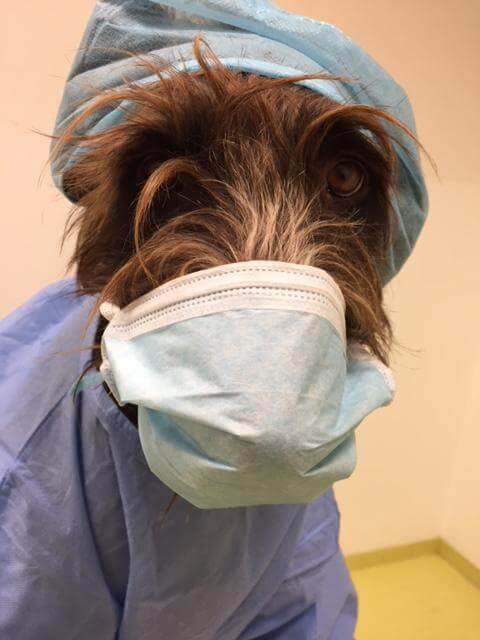News • NHS
Looking to vets’ infectious disease know-how to end Covid-19 lockdown
The UK government should look to veterinary infectious disease know-how to end the current lockdown and abandon its financially ruinous strategy to manage the Covid-19 epidemic, argue two leading vets in a trenchant critique of official policy in this week’s Vet Record.

This would mean simultaneously applying the four pillars of disease control vets use in any animal outbreak, but which the government has lamentably failed to do for people, contend Dick Sibley, director and principal of West Ridge Veterinary Practice in Devon, and Joe Brownlie, emeritus professor of veterinary pathology, Royal Veterinary College, London in their opinion piece.*
In practice, this means releasing from lock-down the resilient, who make up around 60% of the population, to build up national immunity and get on with creating much needed wealth, while protecting the remaining vulnerable 40% from exposure to the infection.
The UK government’s current approach to managing the epidemic is to cut overall transmission and spread the epidemic over a longer period to fit the critical care capacity of the NHS, explain the authors. But this is “more a system of delaying deaths than saving lives,” to make the figures “more palatable” to the media and the public, with the effect of wrecking the economy and driving many businesses into financial ruin, to boot, they point out.
And it’s “unacceptable to any livestock vet,” all of whom are well versed in handling disease prevention and control at scale, and as such, have focused on, and invested in, prediction and prevention rather than on treatment strategies. “The only effective long-term control to minimise new infections will be through developing immunity, either by managed exposure or vaccination, while at the same time accepting that there will always be vulnerable individuals requiring intensive treatment and support,” write the authors. Vulnerability can be predicted, they add.
Biosecurity, biocontainment, surveillance and resilience
The current surveillance strategies for Covid-19 appear confused, inappropriate, and undeliverable.
Dick Sibley and Joe Brownlie
“If this was an animal disease outbreak, with similar infectivity, economic connotations and variable clinical outcomes, vets would apply the four pillars of disease control to manage it: biosecurity, biocontainment, surveillance and resilience,” they write. Biosecurity involves curbing the risks of a disease entering the population; biocontainment curbs the risk of spread; surveillance involves testing; and resilience involves managed exposure. But biosecurity against Covid-19 “has been lamentable,” with the UK apparently happy to accept human traffic from infected areas. Biocontainment hasn’t been much better either, say the authors.
“The idea of mixing the infected, infectious, and vulnerable, packing them tightly into concentrated air spaces with noxious air quality, and then moving them over large distances to seed the infection to other susceptible populations would be regarded [by vets] as foolhardy, if not negligent,” insist the authors. But mass transport systems were allowed to continue operating, creating Covid-19 hotspots in many major cities, they point out.
Testing, which is widely used on cattle farms, is important, but will always require careful and skilled interpretation as well as strategic use to be meaningful, they add. And its effectiveness in people will always be stifled by privacy laws, antagonism towards ID cards, and political aversion to national databases, they say. What’s more, “The current surveillance strategies for Covid-19 appear confused, inappropriate, and undeliverable,” they suggest. A news story published in this week’s issue indicates that offers by veterinary laboratories with diagnostic facilities, to help the government reach its intended daily target of 100,000 Covid-19 tests by the end of this month, seem to have fallen on deaf ears. As a result, staff that could usefully have been deployed in testing people, have now been furloughed.
The debate authors highlight that there will always be natural variation in population resilience to an infectious disease, offering the option of managed exposure. “If there is anything fortunate in this ghastly experience, it is that most of the vulnerable can be readily identified, protected, and kept out of the intensive care units; they are generally not the economic generators within the population,” they write. “The young, fit, slim, non-smokers could be left to get on with creating the wealth that we are going to need to secure our futures, instead of being locked away waiting for the inevitable.”
Recommended article

News • Cross-species concerns
Could a new pig virus be a potential threat to humans?
A recently identified pig virus can readily find its way into laboratory-cultured cells of people and other species, a discovery that raises concerns about the potential for outbreaks that threaten human and animal health. Researchers at The Ohio State University and Utrecht University in the Netherlands collaborated to better understand the new virus and its potential reach. Their study, the…
In a research comment, published in this week’s Vet Record, Brownlie and Sibley further emphasise that because of their experience with animal coronaviruses, vets are a valuable resource for helping to understand and control SARS-CoV-2 in people. “Considering their long-term experience gained with animal coronaviruses, vets are in a unique position to help forge a better understanding of the origin and spread of SARS-CoV-2 and guide future research towards the development of effective vaccines and antiviral drugs,” they write.
And in a linked editorial, editor Adele Waters ponders on how vets have been excluded from this crisis despite having valuable expertise and facilities to offer. “Many [vets] are willing to do their bit in the crisis and it turns out that some have been not only telling the government that, they have been offering their services for weeks,” she writes. “This lack of take-up reflects badly on the government.” She concludes: “When it comes to testing, the UK needs all the capacity it can muster. Germany’s lower Covid-19 death rate has been widely attributed to its mass testing programme - something the UK government’s chief medical officer Chris Whitty has said this country must learn from.
“The world has been brought to a full stop by this virus and the UK is facing the biggest threat to public health - and, possibly, our economy - since the Second World War. Every avenue must be explored.”
Source: BMJ Press Release
17.04.2020





